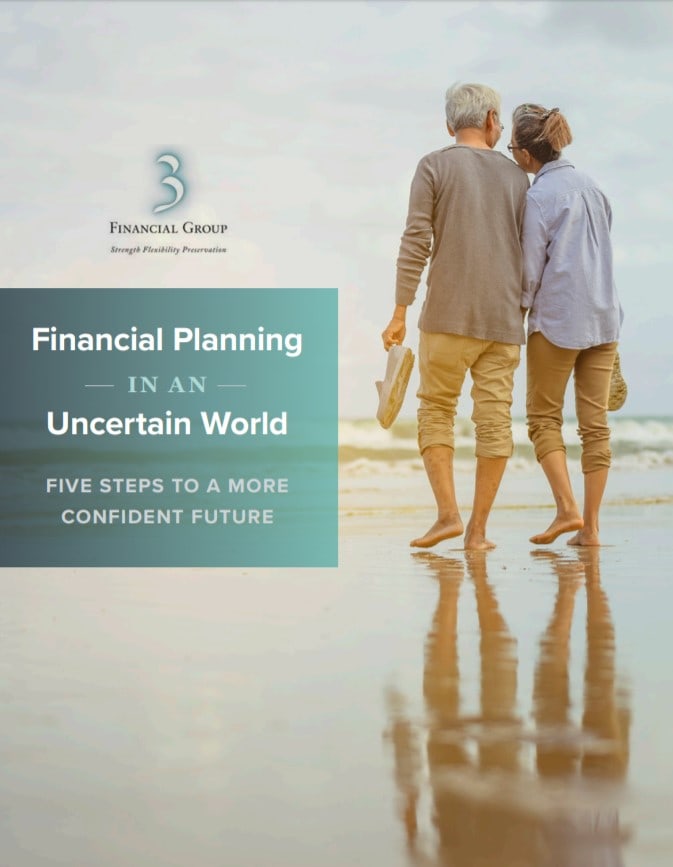There are few things more devastating than losing your life partner. Financial planning is probably the very last thing on your mind. Many of our clients can’t bear to think about the future during such a difficult, insurmountable time – especially when it feels like the grief may never end. It’s okay to feel that way.
Most financial advisors – us included – recommend avoiding major financial decisions until after the first year of grieving has passed. It can take months or years to truly feel like you can swim in the overwhelming waves of grief. But when you feel ready to move forward and feel you can make decisions without the emotional elements of grief involved, it’s important to make important financial decisions that may shape your future.
According to one Fidelity Investments survey, 70% of widows in heterosexual relationships retain a financial advisor during the first year after their spouse’s death. For some women, this unique time marks the first opportunity they have financial independence, without considering another person. Many widows go along with their husband’s financial decision-making and may need extra help understanding how to proceed on their own. For other women, financial advisors often provide a sense of security and comfort knowing they have someone on their side when difficult decisions come knocking.
No matter how you may feel about this new financial step in your life, one thing is certain: as a widow, you will have to make a number of important financial decisions. Here are some of the biggest decisions you may face – and what you need to think about before you act.
How to Financially Survive Widowhood
Here are several key areas of financial advice for widows, in order to start effectively stewarding your financial portfolio.
1. Examine your expenses
Start with your own personal audit of your expenses. The goal here is to take stock of your life prior to your loss and figure out how it might look now that you are a widow, or newly single. You can start by making a list of bills and expenses to determine what level of income you need to survive each month. Think of it as an inventory of your expenses and accounts. You want to better understand everything you own in your name – and everything that may need to be moved to your name in light of your loss. If you are managing a funeral, retirement savings can be used for the expenses, often without any withdrawal penalty.
Armed with this knowledge, you can create a plan to cover expenses for the next 6 to 12 months. This is especially important if you find yourself a newly single mom and need to budget for two. It’s important to understand exactly where your money is going so you can understand what choices you may need to make.
During the grieving process, remember to avoid big decisions and big spending. Instead, focus on thinking more about what you are spending and aligning that spending with your new financial goals and objectives. A financial advisor can help you create a new budget for your new life so you can realign your spending habits.
2. Reconsider your home
Where do you live right now? Thinking more about your current housing can be an important next step in the process. Many new widows wake up one morning to find themselves in a much larger house than they may need. Sure, your kids or friends might visit every so often – but for your day-to-day life, how much space do you really and truly need?
Once a year has passed, it’s time to think about your home. Do you want to go somewhere with less maintenance and upkeep? Or do you want to stay where you are?
This can be an incredibly difficult decision, especially because homes are often tied to memories. You can still remember your partner in the kitchen, making your breakfast – or even sitting on the couch, watching their favorite show. Separating memories from the space in which they occurred can be one of the most challenging parts of grieving, and for many new widows… they’re just not ready to make that decision before a year has passed, and sometimes longer.
Many widows opt to stay in their homes because it’s the place where they raised their children, hosted family gatherings, and made special memories. Your best memories will always be in this house. Other widows decide they want a fresh start in a place. Still, others must make the decision to move because they can no longer afford to keep the house without their partner’s income. If you find yourself in this situation, it is important to make decisions while you still have the freedom and flexibility to do so. Waiting until your credit is ruined or you have run through other assets will limit your choices. Making this decision can be scary, but working with a team of advisors can help with the burden. A good real estate agent, mortgage broker, and financial planner can help you put the pieces together.
When the time is right, consider whether a move might make economic sense for you and your new budget – and whether it might make economic sense emotionally, as well. You, and you alone, can make this decision.
3. Think about your investments
Do you know where your investments are? For many new widows, this may be the very first time they have a large financial responsibility. Some widows may not understand the process of investing. This is especially true if you did not plan jointly with your partner and let them make all the investing decisions. That’s perfectly normal, and it happens to many, many widows.
But in your journey to be a financial feminist and achieve greater financial independence with your new life, you need to take the reigns. Your investment portfolio should be aligned with your needs and your risk tolerance. Widows often have a different level of risk compared to their partner’s investment philosophy and now is a good time to evaluate your own risk tolerance to make sure your investments are properly risk managed.
You may feel confident assessing your existing investment portfolio, and you may not. Just know that you don’t have to take these steps alone – there’s plenty of financial help for widows both online as well as with a financial advisor.
4. Beware of tax time
Taxes tend to sneak up on us in the best of years, but this can be especially true for recent widows who are still coming to terms with their loss and their newfound financial independence.
When tax time rolls around, make sure to work with a trusted tax advisor or family member to help you through the process. Remember: there’s no need to do any of this alone, especially if it overwhelms you.
Working with someone you trust is a great way to ensure that your investments and insurance accounts are in the right place (more on this next) and that your tax documents match. Many recent widows are often surprised by the amount of unfinished business when tax season rolls around, especially if accounts were missed during the inventory phase.
5. Beneficiary designations
There’s a good chance that you and your partner had retirement accounts. When you’re ready, it’s time to update the ownership of all investments and update the beneficiaries on those accounts.
Start with making a list of every place you and your partner ever worked and contributed to an employer-sponsored retirement plan. You’ll need to do the same for life insurance plans, bank accounts, credit union checking accounts, and any other savings accounts. Likewise, you may need to update life insurance plans to keep them up-to-date for yourself. A financial advisor can help you locate these accounts, consolidate them under your management and update beneficiaries.
If you already have an estate plan in place, now is a good time to make sure it is up to date. You may need to update beneficiaries, successor trustees, and powers of attorney. If you don’t have an estate plan, you need one! An estate planning attorney can walk you through the necessary steps.
Key Takeaways
Grief pays no attention to if your loved one was battling a lifelong disease or left far too quickly. The depth of the grief and length of the grief will often vary depending on each person, which is why it’s so important to take these initial steps when you feel comfortable doing so. There’s no need to rush, and there’s no need to do this alone. Only time can heal emotional losses and only time will help you adjust to a new life without a loved one.
The security that you are making solid financial decisions in wake of the loss will only make the transition smoother. The silver lining? There are so many resources, both free and paid, that can help you survive and thrive during the most difficult time in your life.
If you need a trusted partner in the process, feel free to email us so we can help guide you through the entire process and set a new financially independent life in light of your loss. Sometimes, all you need is someone to take your hand and walk you through it all. Remember, we’re here to help.


